动词ing和 ed作形容词
初中英语动词加ing和加ed,动词变形容词的方法与异同
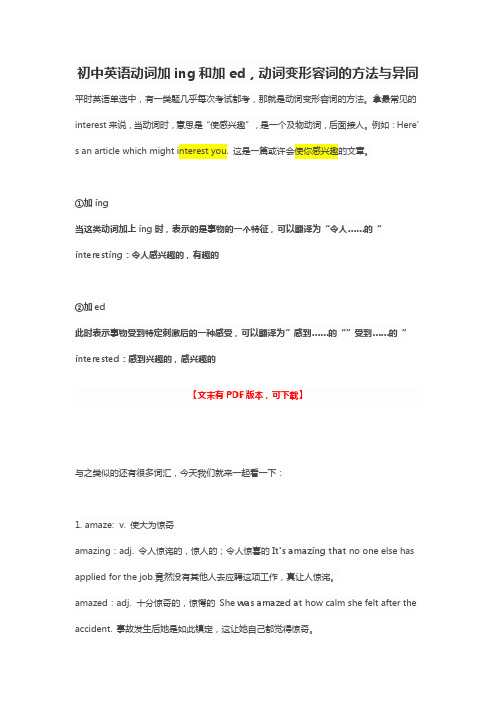
初中英语动词加ing和加ed,动词变形容词的方法与异同平时英语单选中,有一类题几乎每次考试都考,那就是动词变形容词的方法。
拿最常见的interest来说,当动词时,意思是“使感兴趣”,是一个及物动词,后面接人。
例如:Here’s an article which might interest you. 这是一篇或许会使你感兴趣的文章。
①加ing当这类动词加上ing时,表示的是事物的一个特征,可以翻译为“令人……的“interesting:令人感兴趣的,有趣的②加ed此时表示事物受到特定刺激后的一种感受,可以翻译为”感到……的“”受到……的“interested:感到兴趣的,感兴趣的【文末有PDF版本,可下载】与之类似的还有很多词汇,今天我们就来一起看一下:1. amaze: v. 使大为惊奇amazing:adj. 令人惊诧的,惊人的;令人惊喜的It's amazing that no one else has applied for the job.竟然没有其他人去应聘这项工作,真让人惊诧。
amazed:adj. 十分惊奇的,惊愕的She was amazed at how calm she felt after the accident. 事故发生后她是如此镇定,这让她自己都觉得惊奇。
2. annoy:v. 烦扰,打搅,使烦恼annoying:adj. 讨厌的,恼人的It's really annoying when a train is late and there's no explanation. 火车误点而又不作任何解释,这很令人恼火。
annoyed:生气的,烦恼的 I was so annoyed with him for turning up late. 他姗姗来迟,我很生气3. astonish:v. 使吃惊;使惊讶astonishing:adj. 令人惊讶的;惊人的 Her first novel enjoyed an astonishing success. 她的第一部小说取得了惊人的成功。
ing与ed的用法
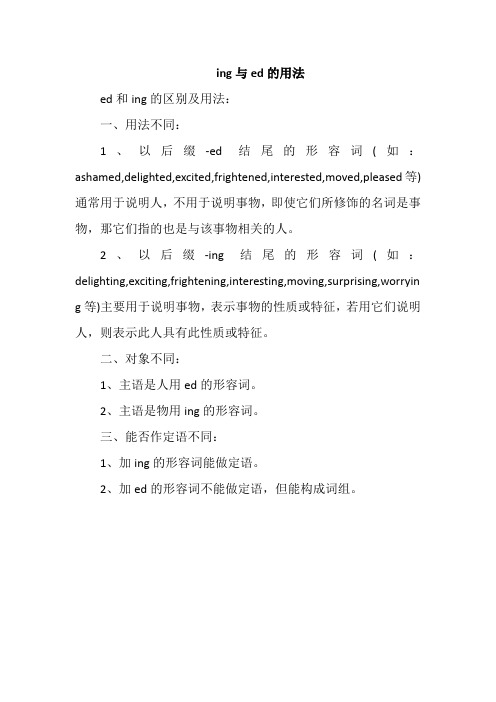
ing与ed的用法
ed和ing的区别及用法:
一、用法不同:
1、以后缀-ed结尾的形容词(如:ashamed,delighted,excited,frightened,interested,moved,pleased等)通常用于说明人,不用于说明事物,即使它们所修饰的名词是事物,那它们指的也是与该事物相关的人。
2、以后缀-ing结尾的形容词(如:delighting,exciting,frightening,interesting,moving,surprising,worryin g等)主要用于说明事物,表示事物的性质或特征,若用它们说明人,则表示此人具有此性质或特征。
二、对象不同:
1、主语是人用ed的形容词。
2、主语是物用ing的形容词。
三、能否作定语不同:
1、加ing的形容词能做定语。
2、加ed的形容词不能做定语,但能构成词组。
英语中加ing形式和ed形式变成形容词的动词

英语中加ing形式和ed形式变成形容词的动词There are 33 English verbs that have different meanings and uses when their endings are changed to -ing or -ed。
When a verb is changed to -ing。
it indicates a XXX。
For example。
the verb "interest" es "interesting" which means something that is XXX。
On the other hand。
when a verb is changed to -ed。
it indicates a XXX。
For example。
the verb "interest" es "interested" which means XXXHere are some examples of these verbs:1.Amaze: to cause great XXX。
Amazing: XXX。
pleasantly surprising。
XXX: XXX。
2.Annoy: to cause XXX。
XXX: causing XXX。
unpleasant。
XXX: XXX3.Astonish: to cause great surprise or amazement。
Astonishing: causing great surprise or amazement。
remarkable。
Astonished: XXX。
4.Confuse: XXX。
Confusing: XXX misunderstanding。
unclear。
Confused: XXX。
Overall。
XXX.disgusting:adj.令人厌恶的。
非谓语ing和ed做形容词

非谓语ing和ed做形容词
非谓语动词是指动词的非谓语形式,包括动词的现在分词(-ing形式)和过去分词(-ed 形式)。
这两种形式常常用来表示某一行为的状态或性质。
在英语中,非谓语-ing和-ed 可以用来做形容词,用于表达一个名词的性质或特征。
这种用法非常常见,我们可以在日常生活中的各种场合中见到。
-ing形式作为形容词,通常用来表示某个名词所处的状态或行为。
比如:
1. She had a boring day at work.(她上班那天很无聊。
)
2. The running water is so cold.(这流水太冷了。
)
3. I'm smelling something delicious.(我闻到了一些美味的味道。
)
在这些例句中,-ing形式修饰的名词分别是day(日子)、water(水)和something (某物),表示它们所处的状态或行为。
-ed形式做形容词
因为这两种形式都可以用来表达某个名词的性质或特征,所以他们也常常作为动词的补语或是形容词短语,例如:
3. She was fascinated by the scenery.(她被景色所吸引。
)
在这些例子中,-ed和-ing形式都充当了动词的补语,用来描述主语的感受或感受的对象。
这种用法可以使句子更加生动有趣。
总之,非谓语动词-ing和-ed做形容词的用法非常灵活,可以用来表示名词的状态、特征或经历,同时也可以作为动词的补语,使句子更加丰富、生动。
只需要不断地练习,就可以掌握它们的使用方法并增强自己的表达能力。
英语中加ing形式和ed形式变成形容词的动词
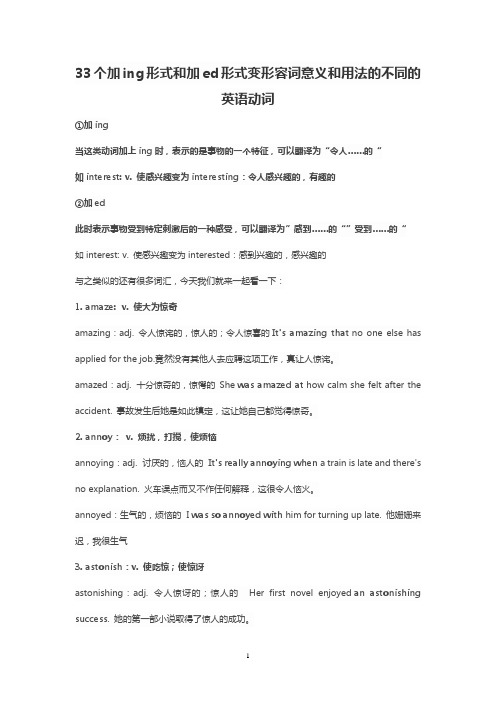
33个加ing形式和加ed形式变形容词意义和用法的不同的英语动词①加ing当这类动词加上ing时,表示的是事物的一个特征,可以翻译为“令人……的“如interest: v. 使感兴趣变为interesting:令人感兴趣的,有趣的②加ed此时表示事物受到特定刺激后的一种感受,可以翻译为”感到……的“”受到……的“如interest: v. 使感兴趣变为interested:感到兴趣的,感兴趣的与之类似的还有很多词汇,今天我们就来一起看一下:1. amaze: v. 使大为惊奇amazing:adj. 令人惊诧的,惊人的;令人惊喜的It's amazing that no one else has applied for the job.竟然没有其他人去应聘这项工作,真让人惊诧。
amazed:adj. 十分惊奇的,惊愕的She was amazed at how calm she felt after the accident. 事故发生后她是如此镇定,这让她自己都觉得惊奇。
2. annoy:v. 烦扰,打搅,使烦恼annoying:adj. 讨厌的,恼人的It's really annoying when a train is late and there's no explanation. 火车误点而又不作任何解释,这很令人恼火。
annoyed:生气的,烦恼的 I was so annoyed with him for turning up late. 他姗姗来迟,我很生气3. astonish:v. 使吃惊;使惊讶astonishing:adj. 令人惊讶的;惊人的 Her first novel enjoyed an astonishing success. 她的第一部小说取得了惊人的成功。
astonished:adj. 感到震惊的;觉得惊骇的 I was astonished to see Miriam there. 我很吃惊地发现米里亚姆竟然在那儿。
高中英语知识点归纳动词与形容词的转化

高中英语知识点归纳动词与形容词的转化动词和形容词是英语中最常见的词类之一,它们在表达中起到了重要的作用。
掌握了动词和形容词的转化规则,可以帮助我们更准确地理解和运用英语。
下面是一些关于动词和形容词转化的知识点的归纳总结。
一、动词与形容词的基本转化方式动词和形容词之间的转化是通过添加后缀或者改变词尾来实现的。
下面是一些常见的转化方式:1. 从动词转化为形容词(1) -ing结尾的形容词:直接在动词后面加-ing。
例如:exciting(令人兴奋的),interesting(有趣的)。
(2) -ed结尾的形容词:直接在动词后面加-ed。
例如:interested(感兴趣的),exhausted(筋疲力尽的)。
(3) -able或-ible结尾的形容词:将动词原形变为“-ate”或“-it”,然后加上后缀。
例如:communicate(交流)→communicable(可传染的)。
(4) -ive结尾的形容词:将动词原形变为“-ion”,然后加上后缀。
例如:impress(印象)→impressive(令人印象深刻的)。
2. 从形容词转化为动词(1) -en结尾的动词:直接在形容词后面加-en。
例如:harden(变硬),lengthen(变长)。
(2) -ize或-ise结尾的动词:直接在形容词后面加-ize或-ise。
例如:modern(现代的)→modernize(使现代化)。
二、常见的动词和形容词转化1. 动词转化为形容词:(1) clean(打扫)→clean(干净的)。
(2) explode(爆炸)→explosive(爆炸性的)。
(3) grow(生长)→growing(不断增长的)。
2. 形容词转化为动词:(1) dead(死)→die(死亡)。
(2) wet(湿)→wet(弄湿)。
(3) smooth(光滑)→smooth(使光滑)。
三、注意事项和常见错误1. 有些动词与形容词具有相同的拼写形式,但含义不同。
以-ing和-ed结尾的形容词

学习必备欢迎下载I. 高中英语中以-ing和-ed结尾的形容词有些形容词是由使役性动词的-ing或-ed形式构成的。
前者表示主动意义,后者表示被动意义。
由于它们的形式与现在分词和过去分词完全一样,故又称之为分词形容词。
amazing令人惊异的; amazed 感到惊异的amusing 令人愉快的; amused 感到开心的boring令人讨厌的;bored感到厌烦的confusing令人迷惑的;confused 感到迷惑的disappointing令人失望的;disappointed 感到失望的disturbing烦人的;disturbed 受到干扰的encouraging令人鼓舞的; encouraged 受到鼓励的entertaining愉快的,有趣的; entertained 感到愉快的freezing 冰冻的,严寒的; frozen 冻僵了的frightening 令人害怕的; frightened 感到害怕的inspiring 令人鼓舞的;inspired受到鼓舞的interesting 令人感兴趣的;interested感兴趣的moving 感动人的;moved 受感动的pleasing 令人高兴的;pleased 感到高兴的puzzling 令人不解的;puzzled 感到不解的surprising 令人惊讶的; surprised 感到惊讶的touching 令人感动的; touched 受感动的worrying令人担忧的;worried 感到担忧的frustrating令人失望的frustrated 感到失望的tiring令人疲劳的tired 劳累的;疲乏的embarrassing令人尴尬的embarrassed感到尴尬的exhausting令人精疲力竭的exhausted 精疲力竭的convincing令人信服的convinced相信的fascinating迷人的;有吸引力的fascinated着迷的thrilling令人紧张的thrilled紧张的impressing给人加深印象的impressed被打动的;被留下印象的relaxing轻松的relaxed放松的;轻松的annoying令人生气的annoyed生气的II.–ed形容词和–ing形容词的用法区别:原则上说,由-ed分词转化来的形容词表被动含义,由-ing分词转化来的形容词表主动含义:a broken heart 破碎的心(=a heart that has been broken)an interesting book 有趣的书(=a book which interests readers)falling leaves 下落的树叶(=leaves that are falling)Everyone was moved by the moving story. 大家都被这个感人的故事感动了。
–ed形容词和–ing形容词的用法区别
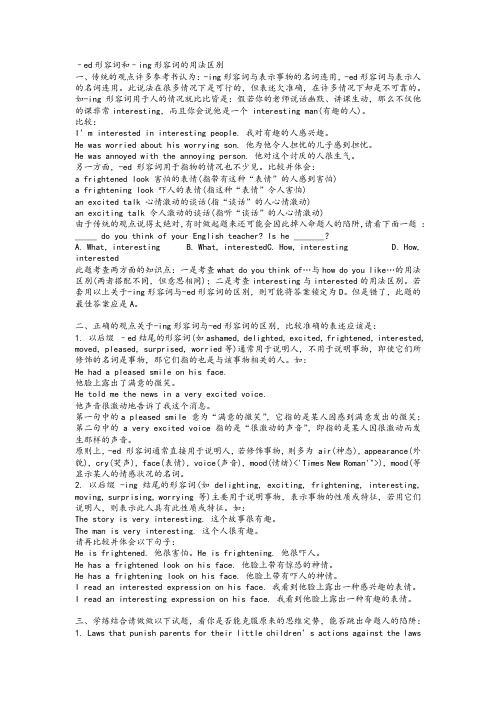
–ed形容词和–ing形容词的用法区别一、传统的观点许多参考书认为:-ing形容词与表示事物的名词连用,-ed形容词与表示人的名词连用。
此说法在很多情况下是可行的,但表述欠准确,在许多情况下却是不可靠的。
如-ing 形容词用于人的情况就比比皆是:假若你的老师说话幽默、讲课生动,那么不仅他的课非常interesting,而且你会说他是一个 interesting man(有趣的人)。
比较:I’m interested in interesting people. 我对有趣的人感兴趣。
He was worried about his worrying son. 他为他令人担忧的儿子感到担忧。
He was annoyed with the annoying person. 他对这个讨厌的人很生气。
另一方面,-ed 形容词用于指物的情况也不少见。
比较并体会:a frightened look 害怕的表情(指带有这种“表情”的人感到害怕)a frightening look 吓人的表情(指这种“表情”令人害怕)an excited talk 心情激动的谈话(指“谈话”的人心情激动)an exciting talk 令人激动的谈话(指听“谈话”的人心情激动)由于传统的观点说得太绝对,有时做起题来还可能会因此掉入命题人的陷阱,请看下面一题:_____ do you think of your English teacher? Is he _______?A. What, interestingB. What, interestedC. How, interestingD. How, interested此题考查两方面的知识点:一是考查what do you think of…与how do you like…的用法区别(两者搭配不同,但意思相同);二是考查interesting与interested的用法区别。
以ing和ed结尾的形容词完整版

以i n g和e d结尾的形容词Document serial number【NL89WT-NY98YT-NC8CB-NNUUT-NUT108】I.高中英语中以-i n g和-e d结尾的形容词有些形容词是由使役性动词的-ing或-ed形式构成的。
前者表示主动意义,后者表示被动意义。
由于它们的形式与现在分词和过去分词完全一样,故又称之为分词形容词。
amazing令人惊异的;amazed感到惊异的amusing令人愉快的;amused感到开心的boring令人讨厌的;bored感到厌烦的confusing令人迷惑的;confused感到迷惑的disappointing令人失望的;disappointed感到失望的disturbing烦人的;disturbed受到干扰的encouraging令人鼓舞的;encouraged受到鼓励的entertaining愉快的,有趣的;entertained感到愉快的freezing冰冻的,严寒的;frozen冻僵了的frightening令人害怕的;frightened感到害怕的inspiring令人鼓舞的;inspired受到鼓舞的interesting令人感兴趣的;interested感兴趣的moving感动人的;moved受感动的pleasing令人高兴的;pleased感到高兴的puzzling令人不解的;puzzled感到不解的surprising令人惊讶的;surprised感到惊讶的touching令人感动的;touched受感动的worrying令人担忧的;worried感到担忧的frustrating令人失望的frustrated感到失望的tiring令人疲劳的tired劳累的;疲乏的embarrassing令人尴尬的embarrassed感到尴尬的exhausting令人精疲力竭的exhausted精疲力竭的convincing令人信服的convinced相信的fascinating迷人的;有吸引力的fascinated着迷的thrilling令人紧张的thrilled紧张的impressing给人加深印象的impressed被打动的;被留下印象的relaxing轻松的relaxed放松的;轻松的annoying令人生气的annoyed生气的II.–ed形容词和–ing形容词的用法区别:原则上说,由-ed分词转化来的形容词表被动含义,由-ing分词转化来的形容词表主动含义:abrokenheart破碎的心(=aheartthathasbeenbroken) aninterestingbook有趣的书(=abookwhichinterestsreaders)fallingleaves下落的树叶(=leavesthatarefalling)Everyonewasmovedbythemovingstory.大家都被这个感人的故事感动了。
动词的-ing和-ed做形容词的区别浅析
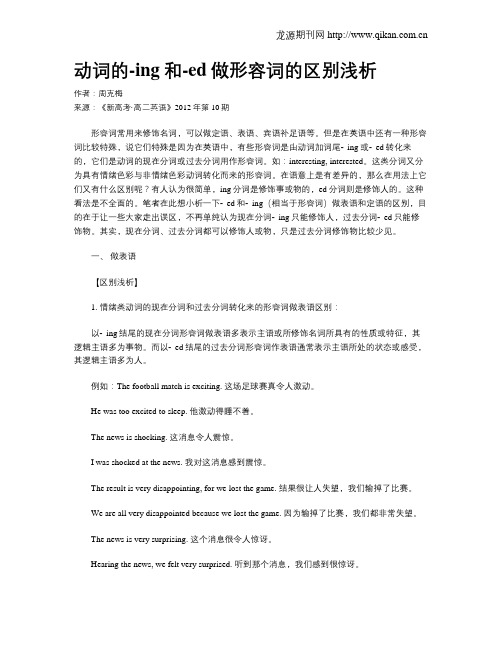
动词的-ing和-ed做形容词的区别浅析作者:周克梅来源:《新高考·高二英语》2012年第10期形容词常用来修饰名词,可以做定语、表语、宾语补足语等。
但是在英语中还有一种形容词比较特殊,说它们特殊是因为在英语中,有些形容词是由动词加词尾⁃ing 或⁃ed转化来的,它们是动词的现在分词或过去分词用作形容词。
如:interesting, interested。
这类分词又分为具有情绪色彩与非情绪色彩动词转化而来的形容词。
在语意上是有差异的,那么在用法上它们又有什么区别呢?有人认为很简单,ing分词是修饰事或物的,ed分词则是修饰人的。
这种看法是不全面的。
笔者在此想小析一下⁃ed和⁃ing(相当于形容词)做表语和定语的区别,目的在于让一些大家走出误区,不再单纯认为现在分词⁃ing只能修饰人,过去分词⁃ed只能修饰物。
其实,现在分词、过去分词都可以修饰人或物,只是过去分词修饰物比较少见。
一、做表语【区别浅析】1. 情绪类动词的现在分词和过去分词转化来的形容词做表语区别:以⁃ing结尾的现在分词形容词做表语多表示主语或所修饰名词所具有的性质或特征,其逻辑主语多为事物。
而以⁃ed结尾的过去分词形容词作表语通常表示主语所处的状态或感受,其逻辑主语多为人。
例如:The football match is exciting. 这场足球赛真令人激动。
He was too excited to sleep. 他激动得睡不着。
The news is shocking. 这消息令人震惊。
I was shocked at the news. 我对这消息感到震惊。
The result is very disappointing, for we lost the game. 结果很让人失望,我们输掉了比赛。
We are all very disappointed because we lost the game. 因为输掉了比赛,我们都非常失望。
动词加ing加ed的用法

动词加ing加ed的用法动词加ing和ed的用法,听起来好像很复杂,但其实挺简单的,就像在调味料里加点盐,瞬间提升了整道菜的味道。
先说说ing吧,想象一下,你在公园散步,看到一群孩子在玩耍,真是活力四射,简直就是“玩耍着”的状态。
我们用这个形式来表达正在进行的动作,比如“看着他们开心地笑”,那种温暖的感觉就像阳光洒在脸上,让人心里一阵甜蜜。
又比如,想象一下你和朋友一起吃饭,聊天聊得正开心,大家都是“聊天着”的状态,时光就这样在欢声笑语中悄悄溜走,真是美好的一刻。
我们聊聊ed。
这玩意儿用起来同样有趣,想象一下你刚看完一部电影,心里久久不能平静,完全是“感动的状态”。
这个时候,你会说“我被这个故事深深感动”,听上去是不是特别有画面感?比如说你和朋友一块儿出去玩,结果被一阵雨淋得透湿,回家后你可能会说“我真是被淋得透湿了”,哎呀,那种感觉,真是让人哭笑不得。
日常生活中,常常会遇到这样的小插曲,嘴边冒出的“哈哈,真是搞笑得很”,就是在描述这种状态了。
动词加ing和ed还可以用在形容词里。
比如,你在某个地方看到一件很惊艳的艺术品,心里一阵激动,便会说“这个作品真是让人惊艳”。
那种欣喜的感觉,不就是一种“惊艳的状态”吗?说到这里,想必大家都经历过这种“迷失”的感觉,站在某个景点前,完全被眼前的美景吸引,情不自禁地说:“哇,太美了!”这就是一种“被美吸引”的状态。
我们生活中的许多瞬间都能用到这些形式,随处可见。
再说说生活中的小细节,比如,你在早上喝咖啡,感觉“喝着咖啡,享受着宁静”,这时候一切都显得那么惬意。
但咖啡喝到一半,手机突然响起,真是“被打断”的状态。
那种心情啊,简直让人想要翻个白眼,心里默念:“真是受够了。
”生活总有各种各样的突发情况,让人哭笑不得。
然后再想想那些总是“忙忙碌碌”的日子,大家都在追赶着时间,谁都想把事情做得完美,但有时候“忙得不可开交”,却反而让生活失去乐趣,这种感觉就像是在永无止境的旋涡里打转。
英语动词加ing或ed

英语中不少动词加ing 或ed 都变成形容词,但词意却大不相同,前于表示客观存的感觉,后者表示主观的感觉。
下面举例说明:1. excite exciti ng excite dI get excite d whenev er I hear the playin g of our nation al anthem.It's such an exciti ng place.2. annoyannoyi ng annoye dIt is annoyi ng to be honest to no purpos e.I'm extrem ely annoye d at the way he always stares at me in the office.3. embarr a ss embarr a ssin g embarr a ssedI don't like making speech es in public; it's so embarr assin g.She was embarr assed when they askedher age.4. astoni sh astoni shing astoni shedThe variet y of his writin g was astoni shing.I was astoni shedat the news of his escape5. fright en fright ening fright enedThe magnit ude of the epidem ic was fright eningThe fright enedchildgrippe d its mother's hand.6. intere st intere sting intere stedY our intere sting report raises severa l import ant querie s.Are you more intere stedin theate r or in televi sion?7. surpri se surpri singsurpri sedIt's surpri sing: they lost!I'm not surpri sed at her frankn ess.8. shockshocki ng shocke dHer racy storie s can be rather shocki ng.I was shocke d by his wicked ness.9. disgust disgustingdi sgus tedThat's disgus ting.I'm disgus ted with her affect ation.10.amuseamusin g amusie dI fail to see why you find it so amusin g.We were greatl y amused.11.bore boring boredIt is awfull y boring.I'm rather boredby the rumor.12.relaxrelaxi ng relaxe dIt is relaxi ng to kite with friend s.Her featur es sudden ly relaxe d.13.puzzle puzzli ng puzzle dThe teache rs explan ation clarif y the puzzli ng proble m.She listen ed with a puzzle d expres sionon her face.14.move moving movedThis is a very moving story.I was moved.15.inspir e inspir i ng inspir e dThe inspir ing musicactedon the emotio ns of the studen ts.The good life is one inspir ed by love and guideby knowle dge.16.encour age encour aging encour agedIt's encour aging to receiv e a favora ble report on one's work.Consum ers are encour agedto compla in aboutfaulty goods.17.disapp ointdisapp ointi ng disapp ointe dI foundit very disapp ointi ng.I was more disapp ointe d than discou raged.18.please pleasi ng please dThis wine is most pleasi ng to the tasteI am only too please d to do busine ss with you.19.discou ragediscou ragin g discou ragedIt's very discou ragin g to be sneere d at all time.I was neverdiscou raged agains t learni ng Englis h.20.affect affect ing affect edShe is consta ntlyunderpressu re and it is affect ing her health She has also been affect ed, but to a lesser degree.21.charmcharmi ng charme dI foundSusana very charmi ng person.He was charme d by her vivaci ty and high spirit s.22.horrif y horrif yinghorrif i edThe possib ility of war is too horrif yingto contem plate.We were horrif ied by what we saw.23.agoniz e agoniz i ng agoniz e dIt is a most agoniz ing sight.He givesan agoniz ed look whenev er he facesdiffic ulty.24.vex vexing vexedThe questi on was funny, but also vexing.She was vexedthat I was late.25.terrif y terrif yingterrif i edThe tidalwave formed a terrif yingwall of water.Jeff did not know what to say, for they were terrif ied.26.humble humbli ng humble dGolf is a humbli ng game .He is a very humble person.27.irrita te irrita tingirrita t edThat is extrem ely irrita ting.Afterthe accide nt, she got irrita ted easily.。
有关人情绪动词的现在分词和过去分词做形容词的用法

有关人情绪动词的现在分词和过去分词做形容词的用法常见情绪动词:interest bore excite frighten charm amuse astonish confuse encourage discourage mislead please press puzzle shock terrify refresh convice horrify annoy disgust disillusion depress move strike impress有关人情绪动词都是及物动词且"人"能够做宾语,它们的现在分词-ing和过去分词-ed多数都已经形容词化.具体用法如下:1.主语+情绪动词+宾语(人) The big dog frightened the little boy.一条大狗吓坏了一个小男孩。
2.情绪动词的现在分词-ing和过去分词-ed做表语a.主语+be+情绪动词的过去分词-ed The little boy was frightened by the big dog.一个小男孩被大狗吓坏了。
注:人+be+情绪动词的过去分词-ed是用法1的被动语态,其中be+情绪动词的过去分词-ed+介词多数是系表结构,不再表被动.类似系表短语有:be excited about,be bored with,be interested in,b.主语+be+情绪动词的现在分词-ing The big dog is frightening.这条大狗令人害怕。
3.情绪动词的现在分词-ing和过去分词-ed做定语区别情绪动词的现在分词和过去分词做形容词的用法,目的在于让一些人走出误区,不再单纯认为现在分词-ing只能修饰人,过去分词-ed只能修饰物.现在分词,过去分词都可以修饰人或物,过去分词修饰物少见.a.情绪动词的现在分词-ing+名词.情绪动词的现在分词-ing意思指令别人感到----,使别人感到----,能给别人带来这种情绪的frightening man 令别人害怕的人 frighteninglook 令别人害怕的表情b.情绪动词的过去分词-ed+名词情绪动词的过去分词-ed意思指自己感到----,自己有这种情绪的frightened man 受了惊吓的人 frightened look 惊恐的表情frightening man 意思是别人害怕 frightened man 是自己害怕,都是分词做定语,意思却完全不同,一定要注意区分。
- 1、下载文档前请自行甄别文档内容的完整性,平台不提供额外的编辑、内容补充、找答案等附加服务。
- 2、"仅部分预览"的文档,不可在线预览部分如存在完整性等问题,可反馈申请退款(可完整预览的文档不适用该条件!)。
- 3、如文档侵犯您的权益,请联系客服反馈,我们会尽快为您处理(人工客服工作时间:9:00-18:30)。
1. They were __________(worry worried ) that the hijackers will make further demands.
worrying 2. We are now experiencing a very ____________(worry) situation. tired 3. I’m ________( tire) of watching TV; let’s go to bed. troubled trouble ) ; is anything worrying you? 4. You look _________( troubling trouble ) news kept them awake all night. 5. The __________( tiring 6. The __________(tire) work made them lose their temper.
Adjectives ending in -ing and -ed
If you cannot decide between “I’m excited” and “I’m exciting”, just think of : “feel” . If we can say “ I feel excited.” then it must be “ I’m excited.” If you hesitate over completing the sentence “The film was very excited / exciting”, decide whether “The film excites someone” or “The film is excited by something”If so, exciting People who make a lot of noise are____________. annoying annoying They annoy people, so they are ___________people. annoying These people are ____________ to others. (annoy)
disappointing 8. Your exam results are very _______________(disappoint).
annoyed annoy) by your rudeness. 9. I was ___________( surprised 10. I was ___________( surprise ) by her hairstyle. 11. I’m very interested ___________(interest) in history.
annoyed They have an __________look on their faces because they annoyed so their look is ____________. annoyed feel___________, exciting 1. Xiao Li told me an _____________news. exciting 2. The news was_____________ to me. excited 3. I felt /was ____________by / about the exciting news. excited • The news really ______________me. (vt.) •
annoying The noise these people make is_________ห้องสมุดไป่ตู้_____.
annoy It is an ______________noise. annoying annoys The noise_____________people.
annoyed People are ____________by the noise.
excited I had an ____________look on my face when I heard the news.
excited excite ) by the smell of the food. 1. The dog was _________( interesting interest) subject. 2. I think history is a very __________( 3. Nothing happens in the book. It’s veryboring _________(bore). bored 4. It rained all day, and I was very ___________(bore). relaxed 5. She felt _________(relax) after a cup of coffee. surprising 6. The news was very _____________(surprise). exciting 7. Driving a fast car is ____________(excite).
satisfied 7. The employer seemed ____________(satisfy) with her work.
8. Mr. Young gave Simon an _____________(encourage) encouraging smile. encouraged 9. Simon felt ____________(encourage) at /by his words. frightened 10. Girls usually are ____________(frighten) of dogs.
